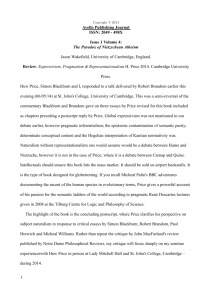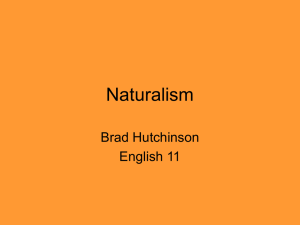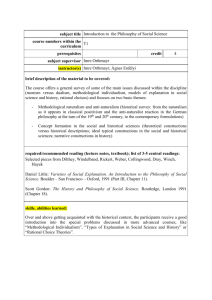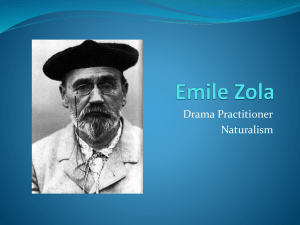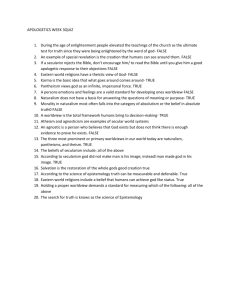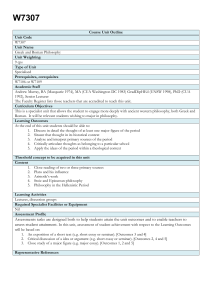Naturalism Without Mirrors
advertisement
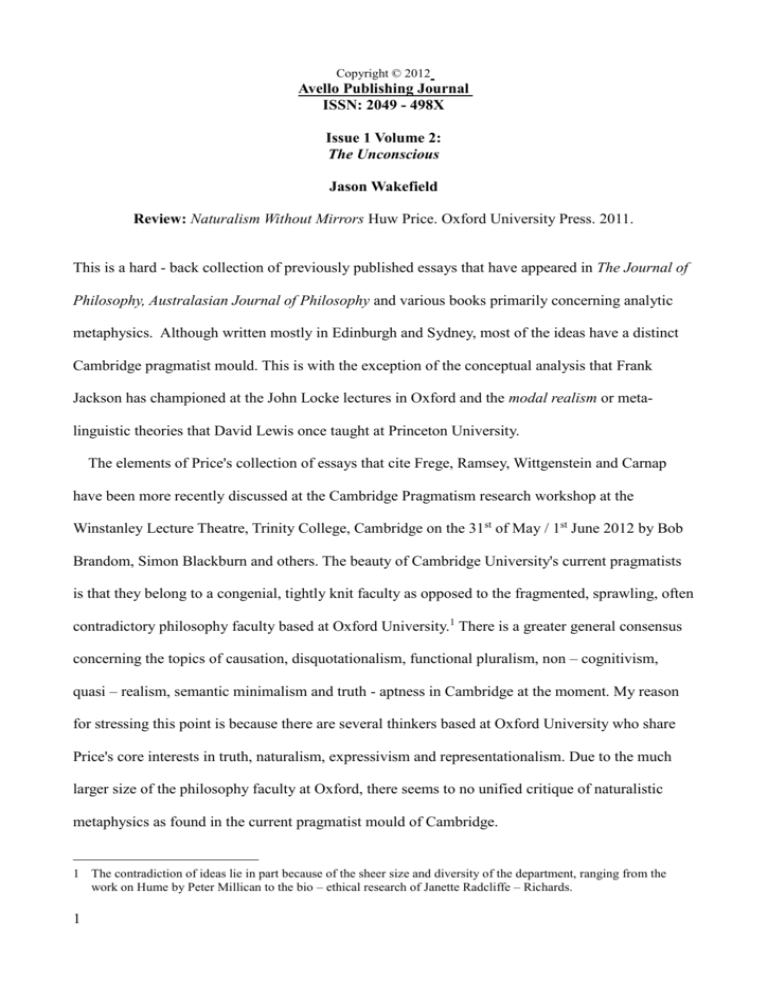
Copyright © 2012 Avello Publishing Journal ISSN: 2049 - 498X Issue 1 Volume 2: The Unconscious Jason Wakefield Review: Naturalism Without Mirrors Huw Price. Oxford University Press. 2011. This is a hard - back collection of previously published essays that have appeared in The Journal of Philosophy, Australasian Journal of Philosophy and various books primarily concerning analytic metaphysics. Although written mostly in Edinburgh and Sydney, most of the ideas have a distinct Cambridge pragmatist mould. This is with the exception of the conceptual analysis that Frank Jackson has championed at the John Locke lectures in Oxford and the modal realism or metalinguistic theories that David Lewis once taught at Princeton University. The elements of Price's collection of essays that cite Frege, Ramsey, Wittgenstein and Carnap have been more recently discussed at the Cambridge Pragmatism research workshop at the Winstanley Lecture Theatre, Trinity College, Cambridge on the 31st of May / 1st June 2012 by Bob Brandom, Simon Blackburn and others. The beauty of Cambridge University's current pragmatists is that they belong to a congenial, tightly knit faculty as opposed to the fragmented, sprawling, often contradictory philosophy faculty based at Oxford University.1 There is a greater general consensus concerning the topics of causation, disquotationalism, functional pluralism, non – cognitivism, quasi – realism, semantic minimalism and truth - aptness in Cambridge at the moment. My reason for stressing this point is because there are several thinkers based at Oxford University who share Price's core interests in truth, naturalism, expressivism and representationalism. Due to the much larger size of the philosophy faculty at Oxford, there seems to no unified critique of naturalistic metaphysics as found in the current pragmatist mould of Cambridge. 1 The contradiction of ideas lie in part because of the sheer size and diversity of the department, ranging from the work on Hume by Peter Millican to the bio – ethical research of Janette Radcliffe – Richards. 1 Although based at different university faculties at the time of writing Naturalism Without Mirrors portrays the unified thought of Brandom, Blackburn and Price that can be witnessed at Cambridge lectures today. These lectures consist mainly of expression over representation and function over reference. To clarify, he favours Rorytian skepticism about representation and Wittgensteinian pluralism concerning the functions of declarative linguistic behaviour. Prior to invoking these writers, he analyses metaphysics, naturalism and semantic minimalism through the thought of Hume, Frege, Carnap, Ramsey and Williamson in pragmatic terms. Williamson is currently the Wykeham Professor of Logic at Oxford University, first occupied by Henry Wall (1810 – 1873). Wall was a contemporary of Henry Longueville – Mansel, the first Waynflete Professor of Moral and Metaphysical Philosophy, currently occupied by John Hawthorne. Williamson and Hawthorne share Price's interest in the linguistic turn in philosophy, however do not engage with Quine's Word and Object, Philosophy of Logic or Theories and Things to develop a discourse on metaphysical pluralism. A strength of Naturalism Without Mirrors is in the positioning of the tables and figures to illustrate crucial points. For example, table 11.1 gives us options for quietism in a crucial section about Blackburn's quasi – realist reading of Wittgenstein, Wright and Rorty. Earlier there is another crucial illustration, table 10.2 that identifies three species of linguistic theory. This helps unpack a contrast with 'a McDowellian theory of meaning grounded on deflationary truth, expressivism about evaluative judgements is essentially immodest' (Price 216: 2012). Readers familiar with Price's Facts and the Function of Truth (1988) will recognise this is where Price is at his philosophical best. Here Price's choice of theorist is also of interest to our editorial board member Adrian Johnston, who has talked about John McDowell, Nancy Cartwright and Wilfred Sellars at the Vitalism and Antivitalism in Contemporary Philosophy conference in Zagreb, June 17th -19th 2011. Price's discussion of McDowell does not explore the debates that Brassier, Hägglund, Johnston and Malabou had at the round – table evening sessions during this conference; however a 2 juxtaposition of the videos recorded in Zagreb and the videos recorded in Cambridge at Winstanley Lecture Theatre, Trinity College this summer could potentially form the basis of an excellent book.2 On a more critical note, Dummett's Frege: Philosophy of Language (1973) could have been analysed more closely by Price. There is a reference to Dummett's intuitionist logic and the Fregean sense – force distinction but the incompleteness of concepts and functions is perhaps much more important to any linguist who wishes to defeat representationalism. Despite this limitation, Price does give a logical, convincing argument on how to obtain 'naturalism without Representationalism, or naturalism without mirrors' (Price 5: 2011). This is because 'science is only one of the games that we play with language' (Price 31: 2011) as 'semantic deflationism already challenges Representationalism' (Price 32: 2011). Although this is logical and convincing, Price does not cover much new ground here. There does not seem to be much progression past Humean intuitionist tendencies or orthodox semantic and metaphysical deflationism. This recapitulation of already common ideas is concluded with some contradictory remarks regarding how we should support Brandom's interventions endorsing representationalism where assertion is the fundamental language game. Price's contradiction is clear in a book that he cites in his final chapter Making it Explicit: 'the inferentialist's attempt to turn the explanatory tables on the representationalist tradition must be deemed desperate and unsuccessful' (Brandom 136: 1994). In conclusion, my evaluation is that the primary readership of Naturalism Without Mirrors does not consist of Australian students interested in modern 20th Century philosophy, but consists of English and American students interested in the intricacies of vocabulary in literature and language. This is because of Price's emphasis on Carnap's bizarre rejection of the reality of the external world as guided by Wittgenstein. What Price offers is an analysis of the referential aspect of language, clarification of grammatical misunderstandings, indexical cases and modal cases. To clarify, Price is more focused on the semantic relation between words, rather than Brandom's more philosophical, 2 The book Deconstruction and Pragmatism by Critchley, Derrida, Laclau & Rorty (1996) derived from the symposium organised in Paris by Mouffe on May 29 th 1993 is in need of an update in the light of the recent conferences in Cambridge and Zagreb. 3 Hegelian project about the social constitution of concepts. Where Hegel and Brandom have a philosophic disposition to truth – conditions, as Price has in his earlier work, Price and Blackburn have a linguistic disposition to propositions. It is not the work of Dewey and Rorty which Price has inherited but the work of Ramsey and Wittgenstein. The canonical context of Price's argumentation does not stray far past what has previously been published by Searle and Geach in their stock philosophical debates. Many of these debates have formed the subject matter of conversations that have ensued after my recent visits to G.E Moore's grave which is situated in the same cemetery as Wittgenstein, Ramsey and two of Darwin's sons grave. It should be noted that Wittgenstein served as an officer on the frontline during World War I, which is why one has taken a photograph of his grave (in Cambridge), in addition to a photograph of a statue (in London) based on Field Marshall Herbert Kitchner, British Secretary of State, who died half way through the war. Naturalism Without Mirrors is an excellent addition to collectors of his work that have been interested in Price since his exertions on Einstein popularised by Time's Arrow and Archimedes Point: New Directions for the Physics of Time. Price is currently a fellow of Trinity College, whose alumni include six British prime ministers, King George VI, several heads of other nations, physicists Isaac Newton and Niels Bohr, and the Soviet spies Kim Philby, Guy Burgess and Anthony Blunt. My last, recent visit to Trinity was for architectural reasons and not to discuss representationalism with Price, as the Clock Tower in the Great Court is named after Edward III after being redesigned by Thomas Neville. Naturalism Without Mirrors is like a greatest hits compilation of an intellectual stars greatest years, it is well worth buying unless you already have Minds, Worlds and Conditionals: Essays in Honour of Frank Jackson where chapter 12 first appeared. 4
